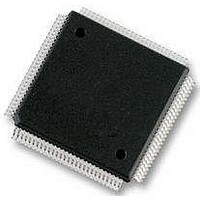MC9S12E128CPV Freescale Semiconductor, MC9S12E128CPV Datasheet - Page 231

MC9S12E128CPV
Manufacturer Part Number
MC9S12E128CPV
Description
Microcontrollers (MCU) 16 Bit 16MHz
Manufacturer
Freescale Semiconductor
Datasheet
1.MC9S12E128CPV.pdf
(606 pages)
Specifications of MC9S12E128CPV
Data Bus Width
16 bit
Program Memory Type
Flash
Program Memory Size
128 KB
Data Ram Size
8 KB
Interface Type
SCI, SPI
Maximum Clock Frequency
25 MHz
Number Of Programmable I/os
92
Number Of Timers
16 bit
Operating Supply Voltage
3.135 V to 5.5 V
Maximum Operating Temperature
+ 85 C
Mounting Style
SMD/SMT
Package / Case
LQFP-112
Minimum Operating Temperature
- 40 C
On-chip Adc
10 bit
On-chip Dac
8 bit, 2 Channel
Lead Free Status / Rohs Status
No RoHS Version Available
Available stocks
Company
Part Number
Manufacturer
Quantity
Price
Company:
Part Number:
MC9S12E128CPVE
Manufacturer:
Freescale Semiconductor
Quantity:
10 000
- Current page: 231 of 606
- Download datasheet (4Mb)
6.4.1.2
The analog input multiplexer connects one of the 16 external analog input channels to the sample and hold
machine.
6.4.1.3
The sample amplifier is used to buffer the input analog signal so that the storage node can be quickly
charged to the sample potential.
6.4.1.4
The A/D machine performs analog to digital conversions. The resolution is program selectable at either 8
or 10 bits. The A/D machine uses a successive approximation architecture. It functions by comparing the
stored analog sample potential with a series of digitally generated analog potentials. By following a binary
search algorithm, the A/D machine locates the approximating potential that is nearest to the sampled
potential.
When not converting the A/D machine disables its own clocks. The analog electronics continue drawing
quiescent current. The power down (ADPU) bit must be set to disable both the digital clocks and the analog
power consumption.
Only analog input signals within the potential range of V
in a non-railed digital output codes.
6.4.2
This subsection explains some of the digital features in more detail. See register descriptions for all details.
6.4.2.1
The external trigger feature allows the user to synchronize ATD conversions to the external environment
events rather than relying on software to signal the ATD module when ATD conversions are to take place.
The external trigger signal (ATD channel 15) is programmable to be edge or level sensitive with polarity
control.
on the external trigger function.
During a conversion, if additional active edges are detected the overrun error flag ETORF is set.
Freescale Semiconductor
ETRIGLE
X
X
0
0
1
1
Table 6-23
Digital Sub-Block
ETRIGP
Analog Input Multiplexer
Sample Buffer Amplifier
Analog-to-Digital (A/D) Machine
External Trigger Input (ETRIG)
X
X
0
1
0
1
gives a brief description of the different combinations of control bits and their effect
ETRIGE
0
0
1
1
1
1
SCAN
Table 6-23. External Trigger Control Bits
X
X
X
X
0
1
MC9S12E128 Data Sheet, Rev. 1.07
Ignores external trigger. Performs one conversion sequence and stops.
Ignores external trigger. Performs continuous conversion sequences.
Falling edge triggered. Performs one conversion sequence per trigger.
Rising edge triggered. Performs one conversion sequence per trigger.
Trigger active low. Performs continuous conversions while trigger is active.
Trigger active high. Performs continuous conversions while trigger is active.
RL
to V
Chapter 6 Analog-to-Digital Converter (ATD10B16CV2)
RH
Description
(A/D reference potentials) will result
231
Related parts for MC9S12E128CPV
Image
Part Number
Description
Manufacturer
Datasheet
Request
R
Part Number:
Description:
Manufacturer:
Freescale Semiconductor, Inc
Datasheet:
Part Number:
Description:
Manufacturer:
Freescale Semiconductor, Inc
Datasheet:
Part Number:
Description:
Manufacturer:
Freescale Semiconductor, Inc
Datasheet:
Part Number:
Description:
Manufacturer:
Freescale Semiconductor, Inc
Datasheet:
Part Number:
Description:
Manufacturer:
Freescale Semiconductor, Inc
Datasheet:
Part Number:
Description:
Manufacturer:
Freescale Semiconductor, Inc
Datasheet:
Part Number:
Description:
Manufacturer:
Freescale Semiconductor, Inc
Datasheet:
Part Number:
Description:
Manufacturer:
Freescale Semiconductor, Inc
Datasheet:
Part Number:
Description:
Manufacturer:
Freescale Semiconductor, Inc
Datasheet:
Part Number:
Description:
Manufacturer:
Freescale Semiconductor, Inc
Datasheet:
Part Number:
Description:
Manufacturer:
Freescale Semiconductor, Inc
Datasheet:
Part Number:
Description:
Manufacturer:
Freescale Semiconductor, Inc
Datasheet:
Part Number:
Description:
Manufacturer:
Freescale Semiconductor, Inc
Datasheet:
Part Number:
Description:
Manufacturer:
Freescale Semiconductor, Inc
Datasheet:
Part Number:
Description:
Manufacturer:
Freescale Semiconductor, Inc
Datasheet:











